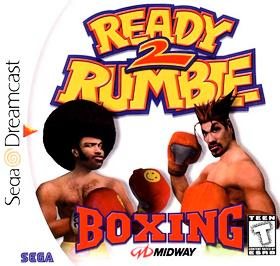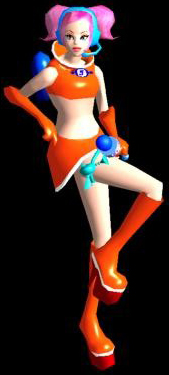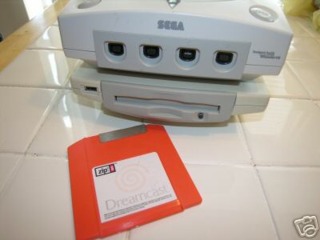In the grand scheme of things, nine years isn't really that long of a time. But in most ways, Sega's Dreamcast feels like ancient history. Instead of doing some sort of top nine favorites or top nine best-sellers or whatever, I wanted to dig a bit more into my memory and think about the Dreamcast stuff that still stands out today.
1. The Launch

PSO was, to me, the Dreamcast's crowning achievement. I probably sunk 200 hours into that game, just grinding through the same four worlds again and again and again with a handful of friends. It was the game that made the Broadband Adapter and keyboard worth owning. It was also the game that made the Dreamcast Game Shark worth owning. Hey, want some hot four-slot armor and a spread needle? Hey, want to crash some lobby servers? The Game Shark's got your back!
Once Sega decided to start charging for PSO in Episode II, the magic was gone. What a bummer.
3. Sega's Development Divisions

4. Shenmue
You know what? I don't like Shenmue at all. But it's certainly one of the most memorable things that happened to the Dreamcast. Yu Suzuki and AM2 went absolutely nuts with ambition. I was able to recognize that, but the execution felt like a mess to me. Not to beat a dead horse, but that game's probably something like a 6.8.
5. The Crazy Hardware That Never Came Out

The other weird DC peripheral was the DC Zip Drive. Remember the Zip Drive? Iomega's custom rewritable format took 100MB disks. I had one for my PC and it was actually pretty handy in its day--meaning the day when blank CDs and CD burners weren't quite commonplace. Sega's version for the DC, I think, came well after the format was done as a viable storage medium on computers. Apparently it would have been used to make the DC a bit better at storing things like e-mail and web pages. Some prototypes of this hardware made it out and occasionally pop up on eBay.
OK, if you've been reading this site for any length of time, you probably already know that I'm no sports fan. But as an observer of the game industry, it was really fascinating to watch Sega rise up and develop its own sports line. Visual Concepts turned the lack of EA's games on the Dreamcast from a weakness into a strength by developing the hell out of some sports games. The NFL 2K series was a monster--a lot of players immediately deemed it to be better than Madden.
Think about all of the things that shook out all this. EA went on to shut this series down by acquiring the exclusive rights to the NFL franchise. And Take-Two Interactive ended up picking up Sega's sports studio and then renamed an entire division of its company after those sports games. And apparently those guys still turn out the best basketball game these days. It was fascinating to watch it all unfold.
7. Imports
As Sega's domestic efforts got weirder and weirder, I found myself turning to imports pretty frequently. I ended up getting a chip soldered into my Dreamcast--this was before the whole boot disc thing came in and made booting imports (and, well, just about anything else) so easy. I have Dreamcast dance mats for playing the fairly-weak DC versions of Dance Dance Revolution. I imported the Japan-only sequel to Samba de Amigo. I imported Super Street Fighter II Turbo (for Matching Service!) and just about any other fighting game that came out in Japan first. I bought a sealed copy of Segagaga even though I couldn't (and still can't) read Japanese. This stuff served as suitable fodder for keeping the system meaningful as the US started descending into stuff like Floigan Brothers.

But still... a DC version of Tekken 3 would have been way more exciting to me.
9. The End
Much like the launch of the Dreamcast, I have pretty specific and weird memories of the day that Sega pulled the plug on the system. The word came via a conference call with Peter Moore delivering the word to the press. I believe it was late January of 2001. They kept using the term "platform-agnostic" to describe the software-only route they were about to take. There had been a few rumors kicking around in the days before the announcement that it was coming, but they were too hard to believe at the time. Listening to that conference call felt historic, even at the time.
So here's the weird part that I'll always remember about that day. I had been fighting off the flu for a bit. My stomach was... a mess. So I ended up listening to a significant portion of the call while planted firmly on the toilet in my hall bathroom, craning my neck out the door to listen to the call. They were taking questions from the media. I don't know if you've ever done this sort of conference call, but it was the sort of thing where you had to give your name as you called in, and then to ask a question you needed to push a button on your phone. I don't see how it could have been anything on my end, because I was pretty far away from my phone and most certainly didn't have a question, but at one point they said "and the next question comes from Jeff Gerstmann." I stayed silent.
It's easy to look back on the Dreamcast now and laugh at what now seem like incredibly obvious and critical tactical errors on the part of Sega. And I try not to let nostalgia sweep me up too much--there were a lot of really lame Dreamcast games. But as a moment in time, the DC's time was historical and, for me anyway, makes for a fascinating story from start to finish.